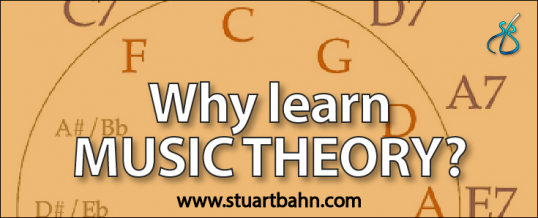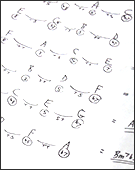
“Why learn music theory? I don’t want to be restricted…”
To the uninitiated, music theory is often thought of as being a set of rules that must be obeyed.
This is not what music theory is about
Music theory is a well-organised system of naming and describing music and how it works. Learning music theory brings meaning to what would otherwise be an anonymous sequence of chords or notes.
Whether a musician plays punk, funk or Paganini, the same names and descriptions apply, and it doesn’t matter if you play the guitar, piano or xylophone. The reason why we should learn music theory is not to be restricted, it’s to make sense of music.
To a guitarist that has not learned any music theory, the following two chord progressions may appear to be quite different:
C Am Dm G
Eb Cm Fm Bb
They are both, however, what is known as I vi ii V chord progressions. The first in the key of C; the second in the key of Eb. The two progressions are essentially the same thing; just that one is in a higher register than the other.
What are the benefits of learning music theory?
When you’ve learned a little music theory, recognising and thinking of chord progressions in this way becomes quite straightforward. And this carries great benefits for musicians, for several reasons:
- Knowing the key of a progression gives a musician who’s learned music theory a great deal of information about what scales, arpeggios and phrases would work well over the sequence.
- Having established the key, a musician that has learned music theory will be aware of other chords that could be substituted in place of, or in addition to, those in the progression.
- It is easier to remember the progression using the Roman numeral names and the key, eg ‘I vi ii V in C’, than the names of the chords themselves. A musician can only do this when they have learned basic understanding of music theory.
- The musician that has learned music theory should already know what the progressions will sound like. Having built up a familiarity with common sequences such as I vi ii V progressions and the ability to recognise them on the page.
 All of this makes life a lot easier for the musician that has learned basic music theory.
All of this makes life a lot easier for the musician that has learned basic music theory.
The musician that has no knowledge of music theory may not spot that the two progressions are essentially the same thing.
They may have to find the right notes to compose or improvise with by trial and error, or stick rigidly to one simple ‘safe’ pentatonic scales.
Although trial and error can and does produce some happy accidents that work well, having to establish the most basic information by this method is unlikely to be an efficient use of time.
Learning music theory and composing
In composition too, music theory is of great value. If a musician has to compose in a certain style or create a certain mood through music, a familiarity with theory will immediately come to his or her aid.
A I vi IV V progression, for example, is the classic sound of the 1950s. Playing bVI bVII i with power chords in a minor key is classic Iron Maiden. Playing a ii V I with diatonic sevenths is classic jazz.
The seven modes of the major scale alone produce seven unique musical flavours that could form the basis of the composition, or at least the starting point.
Does music theory say everything has to be in one key?
Not at all. The naming conventions that we learn in music theory describe the chords and notes that occur outside the major scale just as meaningfully as the ones that occur within it.
Whether it is the tense III-major chord in Jay-Z’s ‘Empire State of Mind’ or the #iv-diminished chord in the chorus of Michael Jackson’s ‘Man in the Mirror’, learning music theory provides us with meaningful names and a framework within which to make sense of them.
 Learn music theory and improve your musicianship
Learn music theory and improve your musicianship
Another benefit of learning music theory is that it helps musicians break out of their metaphorical boxes.
An explicit understanding of how we tend to improvise or compose helps us to find new approaches to freshen up what we do and increase our musical powers.
Learn music theory and improve communication
Finally, the learning the language of music theory also allows musicians to communicate accurately with other musicians in a universal language, regardless of their instrument.
This can be crucial either on a gig or in a writing session when information or ideas need to be shared efficiently and clearly.
If you join a band in which everyone has learned basic music theory except you, there could be difficulties further down the line.
Music theory apps
If you’d like to learn essential music theory using an app, then check out the demo of my music theory app Music Theory – Chords in Keys.
It’s for musicians of all levels that want to learn music theory and become fluent in using it. You can download it from Google Play and iTunes. There’s also a free version available for Android only here.
Conclusion
Playing by ear and understanding music theory is not an either/or relationship. Learning the music theory behind what you do will only enhance your skills as a musician.
Whatever stage you are at in your playing and whatever your musical ambitions, I encourage you to be open to learning about music theory.
Why learn music theory?
Because you will lose nothing and stand to gain a great deal.
If you liked this article on why you should learn music theory please share it with others.
photo credit: h.koppdelaney via photopin cc
photo credit: Ethan Hein via photopin cc
MAY
2013

About the Author:
Stuart Bahn is a professional guitarist and guitar educator in London, England.